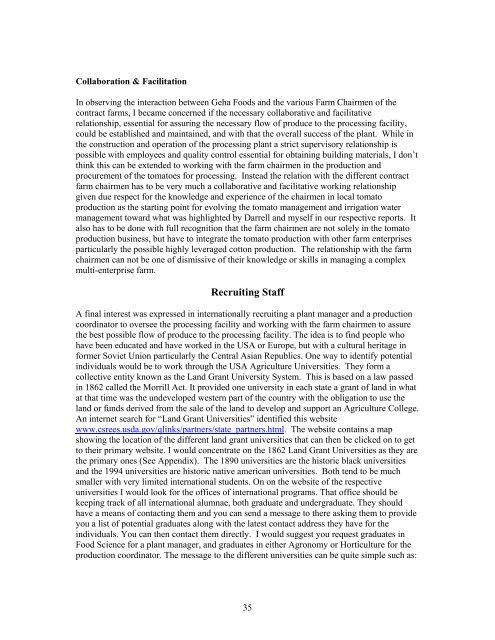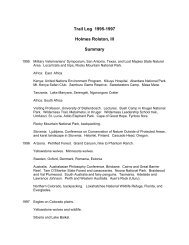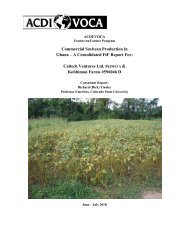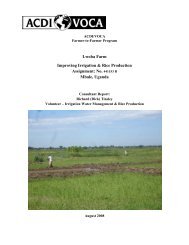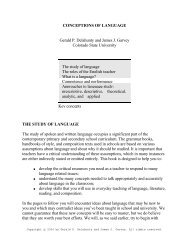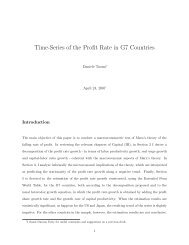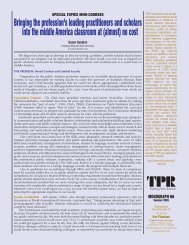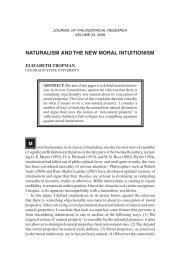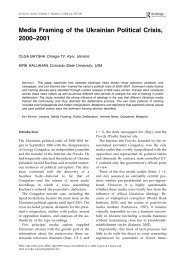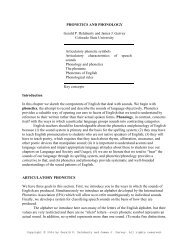Geha Foods Evaluation of Irrigation for Processed Tomatoes
Geha Foods Evaluation of Irrigation for Processed Tomatoes
Geha Foods Evaluation of Irrigation for Processed Tomatoes
You also want an ePaper? Increase the reach of your titles
YUMPU automatically turns print PDFs into web optimized ePapers that Google loves.
Collaboration & Facilitation<br />
In observing the interaction between <strong>Geha</strong> <strong>Foods</strong> and the various Farm Chairmen <strong>of</strong> the<br />
contract farms, I became concerned if the necessary collaborative and facilitative<br />
relationship, essential <strong>for</strong> assuring the necessary flow <strong>of</strong> produce to the processing facility,<br />
could be established and maintained, and with that the overall success <strong>of</strong> the plant. While in<br />
the construction and operation <strong>of</strong> the processing plant a strict supervisory relationship is<br />
possible with employees and quality control essential <strong>for</strong> obtaining building materials, I don’t<br />
think this can be extended to working with the farm chairmen in the production and<br />
procurement <strong>of</strong> the tomatoes <strong>for</strong> processing. Instead the relation with the different contract<br />
farm chairmen has to be very much a collaborative and facilitative working relationship<br />
given due respect <strong>for</strong> the knowledge and experience <strong>of</strong> the chairmen in local tomato<br />
production as the starting point <strong>for</strong> evolving the tomato management and irrigation water<br />
management toward what was highlighted by Darrell and myself in our respective reports. It<br />
also has to be done with full recognition that the farm chairmen are not solely in the tomato<br />
production business, but have to integrate the tomato production with other farm enterprises<br />
particularly the possible highly leveraged cotton production. The relationship with the farm<br />
chairmen can not be one <strong>of</strong> dismissive <strong>of</strong> their knowledge or skills in managing a complex<br />
multi-enterprise farm.<br />
Recruiting Staff<br />
A final interest was expressed in internationally recruiting a plant manager and a production<br />
coordinator to oversee the processing facility and working with the farm chairmen to assure<br />
the best possible flow <strong>of</strong> produce to the processing facility. The idea is to find people who<br />
have been educated and have worked in the USA or Europe, but with a cultural heritage in<br />
<strong>for</strong>mer Soviet Union particularly the Central Asian Republics. One way to identify potential<br />
individuals would be to work through the USA Agriculture Universities. They <strong>for</strong>m a<br />
collective entity known as the Land Grant University System. This is based on a law passed<br />
in 1862 called the Morrill Act. It provided one university in each state a grant <strong>of</strong> land in what<br />
at that time was the undeveloped western part <strong>of</strong> the country with the obligation to use the<br />
land or funds derived from the sale <strong>of</strong> the land to develop and support an Agriculture College.<br />
An internet search <strong>for</strong> “Land Grant Universities” identified this website<br />
www.csrees.usda.gov/qlinks/partners/state_partners.html. The website contains a map<br />
showing the location <strong>of</strong> the different land grant universities that can then be clicked on to get<br />
to their primary website. I would concentrate on the 1862 Land Grant Universities as they are<br />
the primary ones (See Appendix). The 1890 universities are the historic black universities<br />
and the 1994 universities are historic native american universities. Both tend to be much<br />
smaller with very limited international students. On on the website <strong>of</strong> the respective<br />
universities I would look <strong>for</strong> the <strong>of</strong>fices <strong>of</strong> international programs. That <strong>of</strong>fice should be<br />
keeping track <strong>of</strong> all international alumnae, both graduate and undergraduate. They should<br />
have a means <strong>of</strong> contacting them and you can send a message to there asking them to provide<br />
you a list <strong>of</strong> potential graduates along with the latest contact address they have <strong>for</strong> the<br />
individuals. You can then contact them directly. I would suggest you request graduates in<br />
Food Science <strong>for</strong> a plant manager, and graduates in either Agronomy or Horticulture <strong>for</strong> the<br />
production coordinator. The message to the different universities can be quite simple such as:<br />
35


